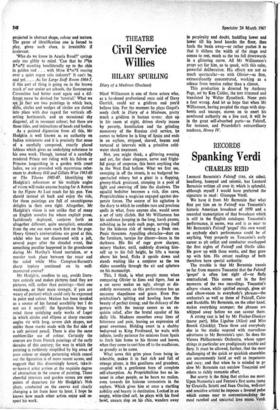Diary of a Madman (Duchess)
THEATRE
Civil Service Willies
HILARY SPURLING
Nicol Williamson is one of those actors who, as a hardened professional once said of Davy Garrick, could act a gridiron and you'd believe him. For the moment he plays Gogol's seedy clerk in Diary of a Madman, pretty much a gridiron in human terms: shut up in his room at night, driven slowly insane by poverty, humiliation and the grinding monotony of the Russian civil service, he comes to believe he is king of Spain and ends in an asylum, stripped, shaved, beaten and tortured at intervals with a primitive cold- water shock treatment.
Not, you might think, a glittering evening and yet, for sheer elegance, nerve and fright- ful pangs of suspense, this beats anything else in the West End hollow. What we first see, sweeping in off the streets, is no badgered be- spectacled misery but a giant in a flapping, greeny-black greatcoat, stooping in a pool of light and swerving off into the shadows. The squalid bedsitter becomes a rich, dim cave, Proprichtchine a magician engaged against des- perate forces. The source of his agitation is the diary to which he confides rare and precious spells in what, from anyone else, would seem a set of tatty clichés. But Mr Williamson has his audience jumping in the long, harsh pauses, subsiding as he ends each page, nerving itself for the hideous risk of turning a fresh one. Panic threatens. Appalling obstacles—dust on the furniture, turnips for dinner—loom in the darkness. His fits of rage grow sharper, misery blacker, until, suddenly drawing him- self up to his full height, he lifts a teacup above his head, flicks it upside down and stands waiting like a conjuror as the tea slides smoothly through the air and splatters on his manuscript.
This, I think, is what people mean when comparing Olivier to lions and tigers. Just as a cat never makes an ugly, abrupt or dis- orderly movement, so this performance has an uncanny shapeliness and grace. Even Pro- prichtchine's spitting and bowling have the beauty of perfect timing; and the delicacy of the gesture with the teacup comes as an ex- quisite relief, after the brutal squalor of his daily life. Madness smoothes away lines of bitterness and pain, leaving .an expression of great sweetness. Holding court in a shabby bedspread as King Ferdinand, he waits with infinite, lordly patience for minions from Spain to fetch him home to his throne and leaves, when they come to cart him off to the madhouse, as grandly as he came.
What saves this grim piece from being in- tolerable, makes it in fact rich and full of strange plums, is this gaudiness and grandeur, coupled with a gentleness born of complete self-absorption. As Proprichtchine has no in- terest in other people, so he bears no malice, even towards his hideous tormentors in the asylum. Which gives him at once a startling nobility and beauty in destitution. Locked in an empty, white-tiled cell, he plays with his food bowl, smears slop on his chin, wanders away in perplexity and doubt, huddling lower and lower till his head knocks the floor, then hurls the basin away—or rather pushes it so that it slithers the width of the stage and comes to rest, much as the tea fell downwards in a glittering curve. All Mr Williamson's props act for him, so to speak, with this calm, powerful deliberation. His effects are not so much spectacular—as with Olivier—as firm, extraordinarily concentrated, working as a release from tension rather than a climax.
This production is directed by Anthony Page, set by Ken Calder, the text trimmed and translated by Walter Eysselinck. None puts a foot wrong. And let us hope that when Mr Williamson, having peopled the stage with slop- bowls and teacups, moves on to exert his newfound authority on a live cast, it will be in the great self-absorbed parts—as Falstaff, for instance, and Pirandello's extraordinary madman, Henry IV.


































 Previous page
Previous page